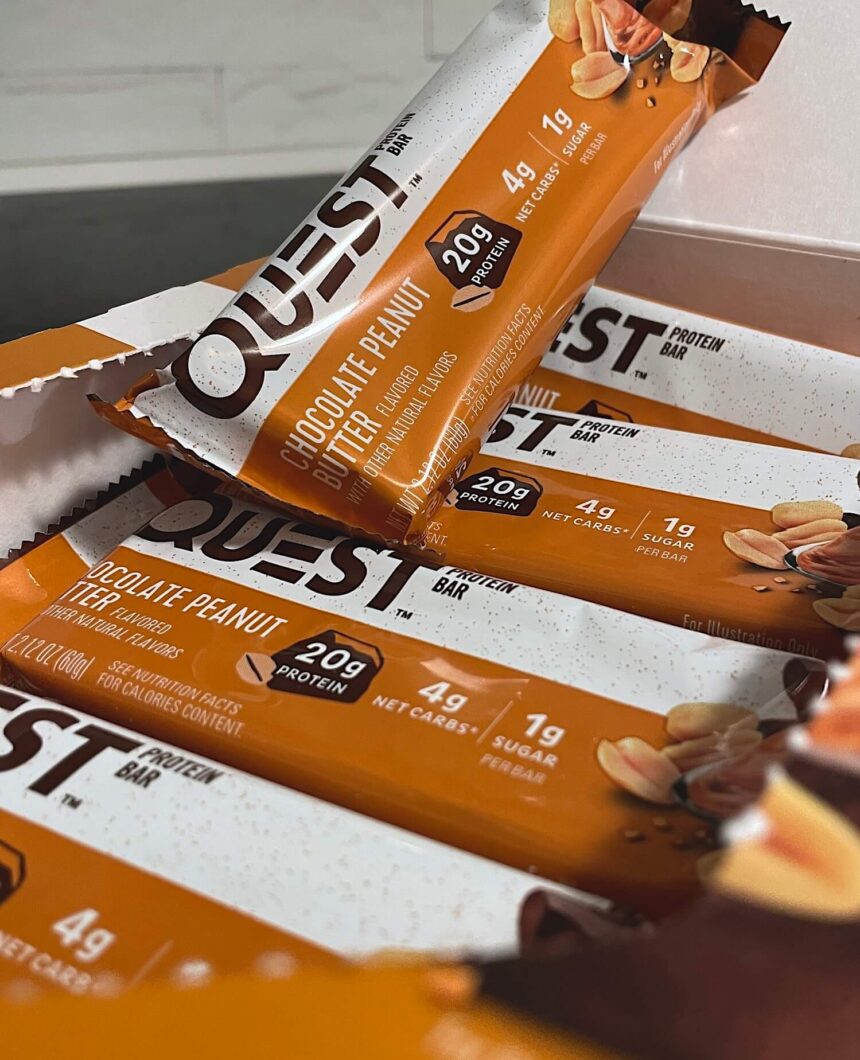Ever since Quest Nutrition was founded in 2010, Quest bars have slowly but surely found their way into the hearts of personal trainers, fitness influencers, athletes, and recreational sports fans who’d like to increase their protein intake or just grab a protein-packed snack during a busy day.
What started as a humble protein bar brand has now grown into a nationwide phenomenon. Today, Quest bars are available in tens of retailers across all states, including 7-Eleven, Kroger, Walmart, Target, Whole Foods, and Trader Joe’s.
According to Quest Nutrition, the company’s mission is to provide great-tasting snacks that aren’t filled with sugar. Instead, the company uses sweeteners for the taste and dairy-based protein for a more bioavailable amino acid profile.
While this may all sound nice, the question remains: are Quest bars healthy, and should you consume them on a regular basis? Our Quest protein bars review investigates the ingredients and nutritional profile more closely so you can decide whether these protein bars fulfill your nutrition needs.
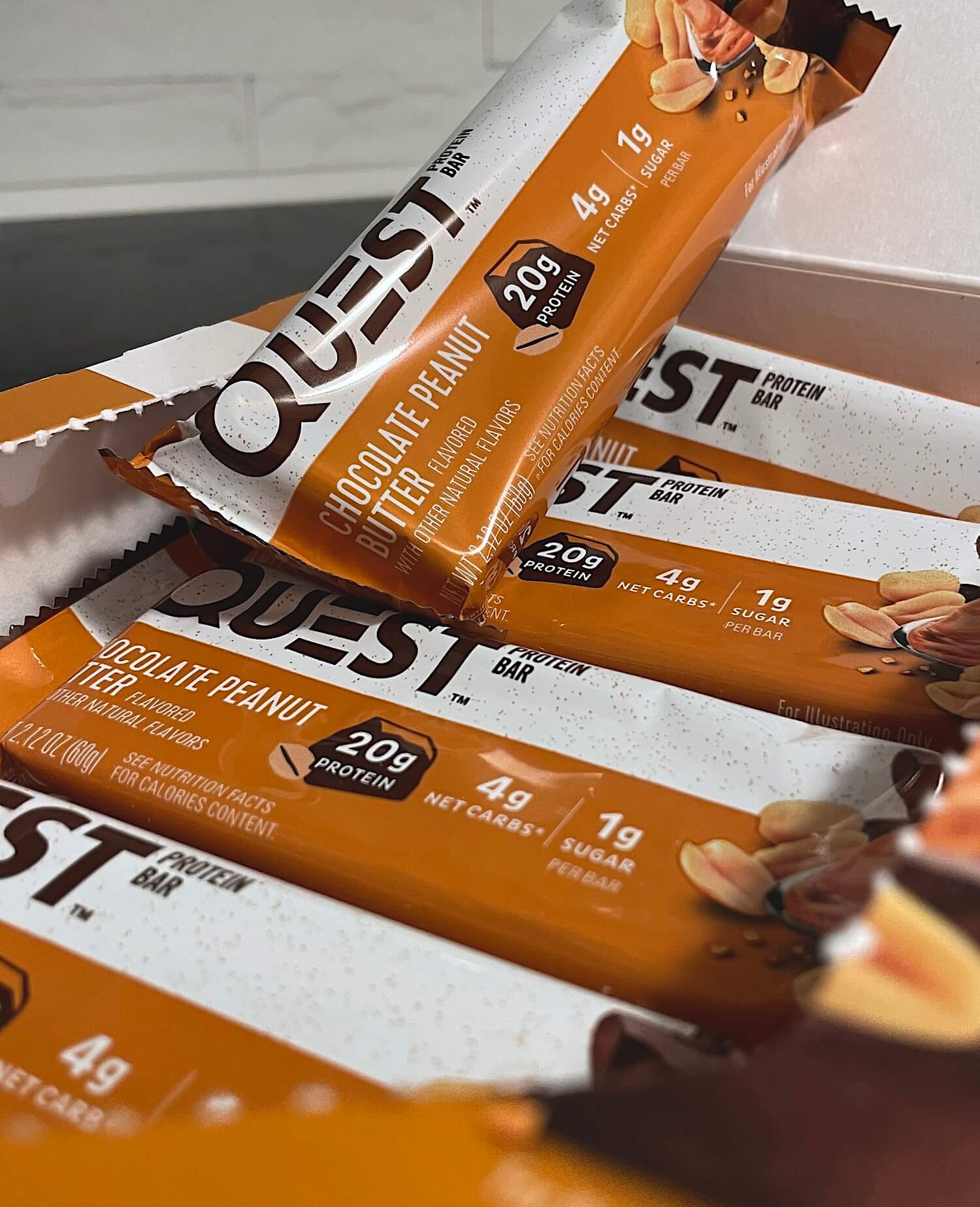
Quest Bars Nutrition Facts
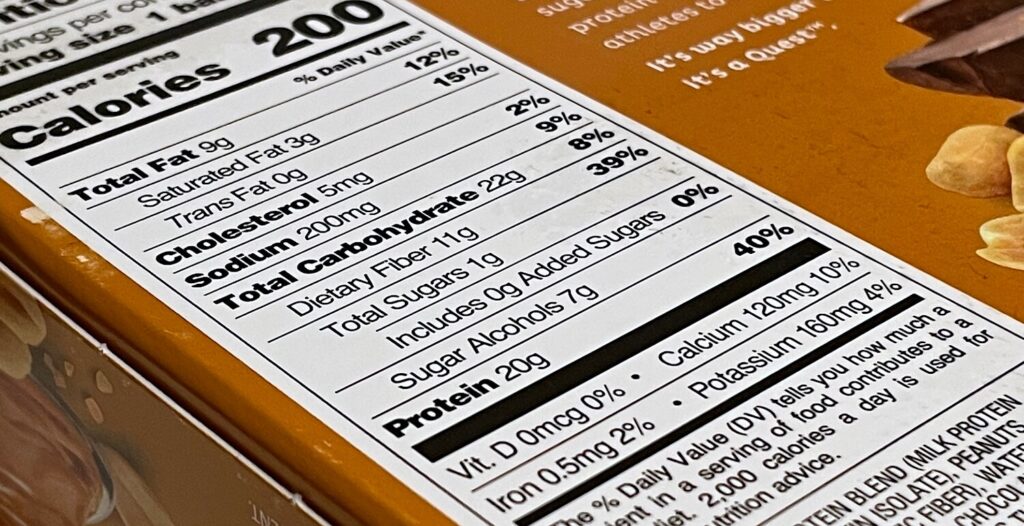
In many ways, Quest protein bars are almost equal to Barebells protein bars: both contain 20 grams of protein and a fair share of calcium.
The greatest advantage of Quest bars is their protein blend, which is entirely dairy-based (therefore, Quest bars are not suitable for vegans).
All Quest protein bars contain a blend of milk protein and whey protein isolate, making it a great source of protein. Dairy-based protein blends are coveted for their bio-availability, making the protein bar a good source of all essential amino acids.
When looking at Quest Bars nutrition more closely, you may notice one peculiar nutrition fact: they’re extremely high in fiber! No matter which Quest Bar flavor you pick, each packs at least 11 grams of fiber (some even 14 – 15 grams).
Most other protein bars out there can’t even come close to that, usually containing a maximum of 5 grams of fiber per bar. This high fiber content may be beneficial to those struggling with constipation.
Sugar and sweetness are probably the most controversial part of Quest Bars. Quest protein bars don’t contain any actual sugar – instead, all bars are sweetened with erythritol and stevia.
While Quest Nutrition’s commitment to low sugar content is commendable, erythritol comes with its side effects and risks, which downgrade the overall quality of Quest bars, too.
Calorie-wise, all Quest bars are between 170 to 200 calories, which is pretty average for a protein bar.
Ingredients in Quest Bars
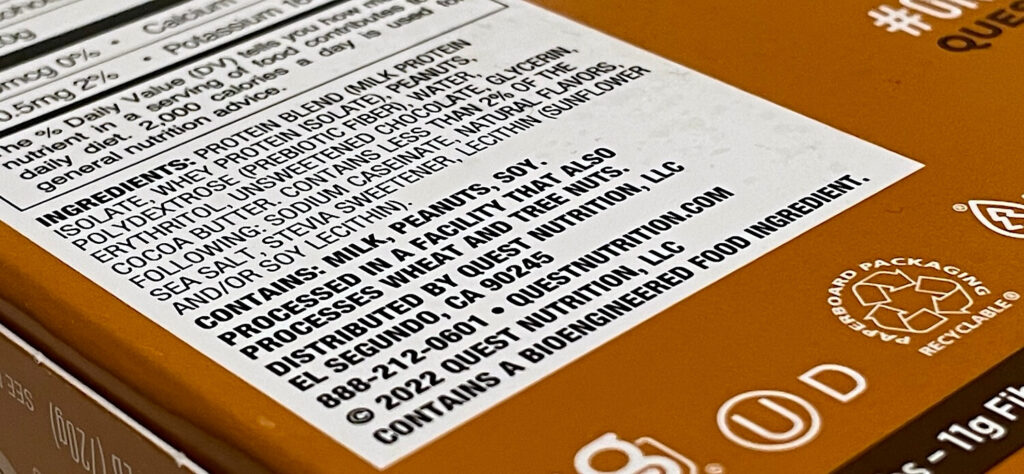
There are over 17 different Quest Bar flavors available, including even funky taste combinations like S’mores, Birthday Cake, Cookies & Cream, or Pumpkin Pie.
Each flavor, of course, has slightly different ingredients when it comes to the specific flavor profile, but the main Quest Bar ingredients remain the same throughout the product selection.
Here’s a quick list of Quest Bar ingredients found in one of their popular flavors ‘Chocolate Peanut Butter’:
- Protein blend (milk protein isolate, whey protein isolate)
- Peanuts
- Polydextrose (prebiotic fiber)
- Erythritol
- Natural flavors
- Unsweetened chocolate
- Glycerin
- Cocoa butter
- Sodium caseinate
- Sea salt
- Stevia sweetener
- Sunflower or soy lecithin
Many studies have found that dairy protein is a simple and cost-effective solution for protein intake: it’s bio-available and encourages muscle growth. This protein blend is the main reason why Quest bars have become so popular: as far as the ingredients go, the protein content in Quest bars is truly great.
Erythritol in Quest Bars: Is It Safe?
The biggest cause for concern in Quest bars is the sweetener erythritol. This sugar alcohol is derived from corn via fermentation, so you could say erythritol is a natural sweetener. Though it also occurs in some fruits naturally, the one used as a sweetener in the food manufacturing industry is hundreds of times more potent.
Several studies suggest that the main adverse effect of erythritol is diarrhea or other digestive issues, including nausea, bloating, and gas. This tends to be the case for all sugar alcohols.
While digestive issues don’t sound that bad, some new research suggests that erythritol may be connected to cardiovascular issues. It seems that sugar alcohols like erythritol may increase the activity of platelets in the blood, which, in turn, increases the risk of heart attack or other cardiovascular issues.
Unfortunately, clinical data concerning a long-term intake of erythritol is still limited – there’s simply not enough research done, and therefore, most research findings are currently inconclusive.
It can’t be said that erythritol may cause cardiovascular issues, but its safety isn’t entirely confirmed yet either, so you may want to tread carefully when consuming sweeteners.
Effects of Polydextrose in Quest Bars
Digestive comfort and Quest protein bars don’t quite go hand in hand. In addition to erythritol potentially creating gastrointestinal discomfort, polydextrose is guilty in the same department.
One of the most common side effects of polydextrose is the laxative effect. Though polydextrose is generally deemed to be safe, it’s no secret it may come with a long list of digestive troubles: gas, bloating, nausea, vomiting, diarrhea, or stomach cramps.
If your digestive system is a bit more sensitive, then it may be wise to stay away from Quest bars.
Other than that, polydextrose is known for its gut-friendly qualities: as a prebiotic fiber, it may even affect the gut microflora positively.
Quest Bar Flavors, Taste and Texture
Good protein content alone doesn’t make a protein bar great. Naturally, it should taste great, and not just because of the sweetener alone.
Flavors and liking are always a matter of individual preference, and fortunately, Quest bars come in many different flavors, as mentioned earlier. There are even special Quest protein bar variety packs available, so you could try 10 different flavors to figure out which one you prefer.
Many people who’ve tried Quest bars, however, find the sweetener’s taste to be quite overpowering or even unpleasant. Depending on your taste buds, you may feel the “artificial” sweetness too heavily, drowning up other nuances.
Our team tested several Quest bar flavors, among which the Chocolate Peanut Butter flavor came out as the top: it has a mild resemblance to a Snickers bar with its whole peanuts and a slight hint of chocolate.
The Chocolate Brownie one, while really reminding you of a somewhat tougher brownie, may work for those looking for a chewier texture.
Blueberry Muffin flavor surprised us with its slight crunchiness, though we’d say it lacks the true essence of blueberry, and the distinct smell and flavor of the sweetener come out especially strongly in this one.
Texture-wise, Quest bars are quite tough and chewy, though not unpleasant to bite. Some flavors may be slightly chewier (like the Brownie flavor), whereas some may have little crunchy bits and pieces that add texture nuances (and may be a bit more fun to chew on).
Compared to Barebell, however, we have to say Quest protein bar flavors and textures don’t come close to Barebell bars.
Verdict: Are Quest Protein Bars Healthy?
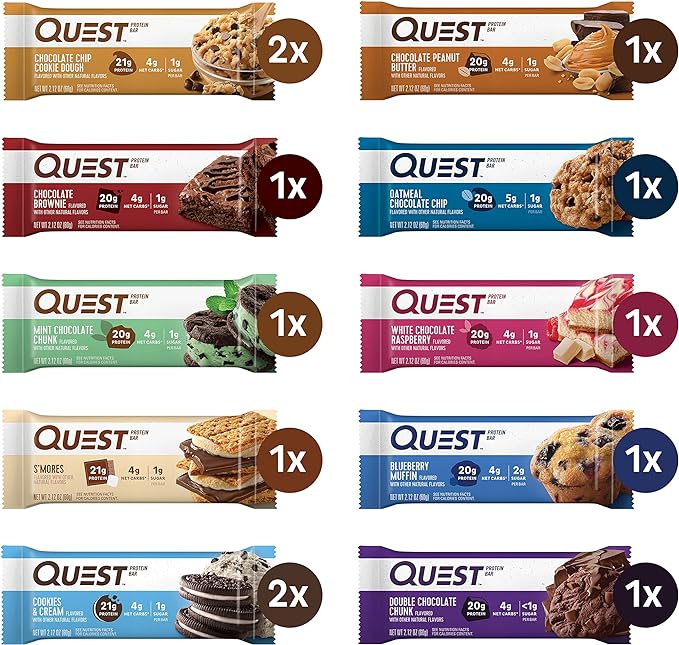
Quest Nutrition Ultimate Variety Pack Protein Bars
– Try the variety pack to enjoy all of the most popular flavors
– High-fiber protein bars
– High-quality dairy-based proteins to help give your body the amino acids you need
Generally speaking, Quest protein bars are not exactly the ‘cleanest’ protein bars out there.
Erythritol is still questionable since there’s not enough research available. A few studies, however, have highlighted some troublesome issues that may even involve cardiovascular health. Erythritol’s safety is still under debate, and that alone may be a reason enough to keep your protein bar habit more humble.
Quest bars also contain lecithins, which may have some issues – especially soy lecithin.
For its protein content, Quest bars are excellent snacks, though. Only a few protein bar brands can boast a 20-gram protein content per bar. If you’re looking for a quick protein-packed snack, Quest bars may definitely do the trick. It’s just important to be mindful of the potential issues that some Quest bar ingredients may have.
Those with a more sensitive digestive system may not find Quest bars the best choice, simply due to some of the gastrointestinal discomfort that may be brought on by a few Quest bar ingredients.
And remember – protein bars are nutritional supplements, not meal replacements. Due to their sweet taste and pleasant texture, protein bars can often seem like yummy “health-promoting” snacks, but they shouldn’t be treated as such.
Even if you enjoy Quest protein bars, keep your consumption moderate and remember that Quest products are not meant to replace whole meals.


